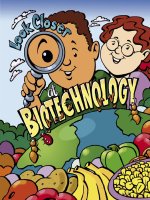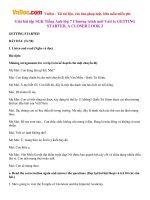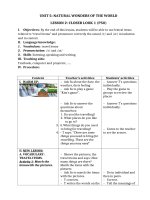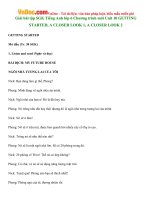- Trang chủ >>
- Sư phạm >>
- Sư phạm văn
Unit10A closer look1
Bạn đang xem bản rút gọn của tài liệu. Xem và tải ngay bản đầy đủ của tài liệu tại đây (597.51 KB, 9 trang )
<span class='text_page_counter'>(1)</span>Teacher: Huynh Phong Dinh.
<span class='text_page_counter'>(2)</span> orbit. experienced launched landed trained.
<span class='text_page_counter'>(3)</span> 2. Choose a word/phrase in the box to fill each blank.. Anyone can apply to train as an astronaut as long as they have a bachelor’s degree in science, mathematics or engineering, experience as a jet pilot, and are in (1) __________. good health If they get accepted, there are several phases of training. The first phase requires them to pass a swimming test in (2) __________. a flight suit They take (3) parabolic ___________ flight that produce weightlessness. They also learn about various spaceship systems. In the second phase, they are trained to (4) __________ spacecraft systems operate and deal with emergencies. The training often takes place in a water tank laboratory so that trainees become familiar with crew activities in simulated microgravity in order to perform (5) _____________. spacewalks.
<span class='text_page_counter'>(4)</span>
<span class='text_page_counter'>(5)</span> Which planet of our solar system is being described in each sentence? Guess the planets and write their names. 1. This planet is the second brightest object in our night sky. Only the moon is brighter. Venus 2. Nearest to the Sun, this planet is extremely hot during the daytime and extremely cold at night. Mercury 3. The largest planet in our solar system that has more gravity than Earth, and many storms. Jupiter 4. This planet has a surface of red dirt and rocks and there are signs of ancient floods on it. Mars 5. This dark, cold planet is the farthest from the Sun and takes almost 165 Earth years to orbit the Sun. Neptune Earth 6. This is the only planet in our solar system that is known to have life. 7. Called ‘The Jewel of the Solar System’, this is the only planet whose beautiful rings can be seen from Earth with a telescope. The day Saturday was named after this planet. Saturn 8. The atmospheric temperature of this ‘ice giant’ planet can be as low as -224°C, the coldest temperature of any planet. Uranus.
<span class='text_page_counter'>(6)</span>
<span class='text_page_counter'>(7)</span>
<span class='text_page_counter'>(8)</span>
<span class='text_page_counter'>(9)</span>
<span class='text_page_counter'>(10)</span>









